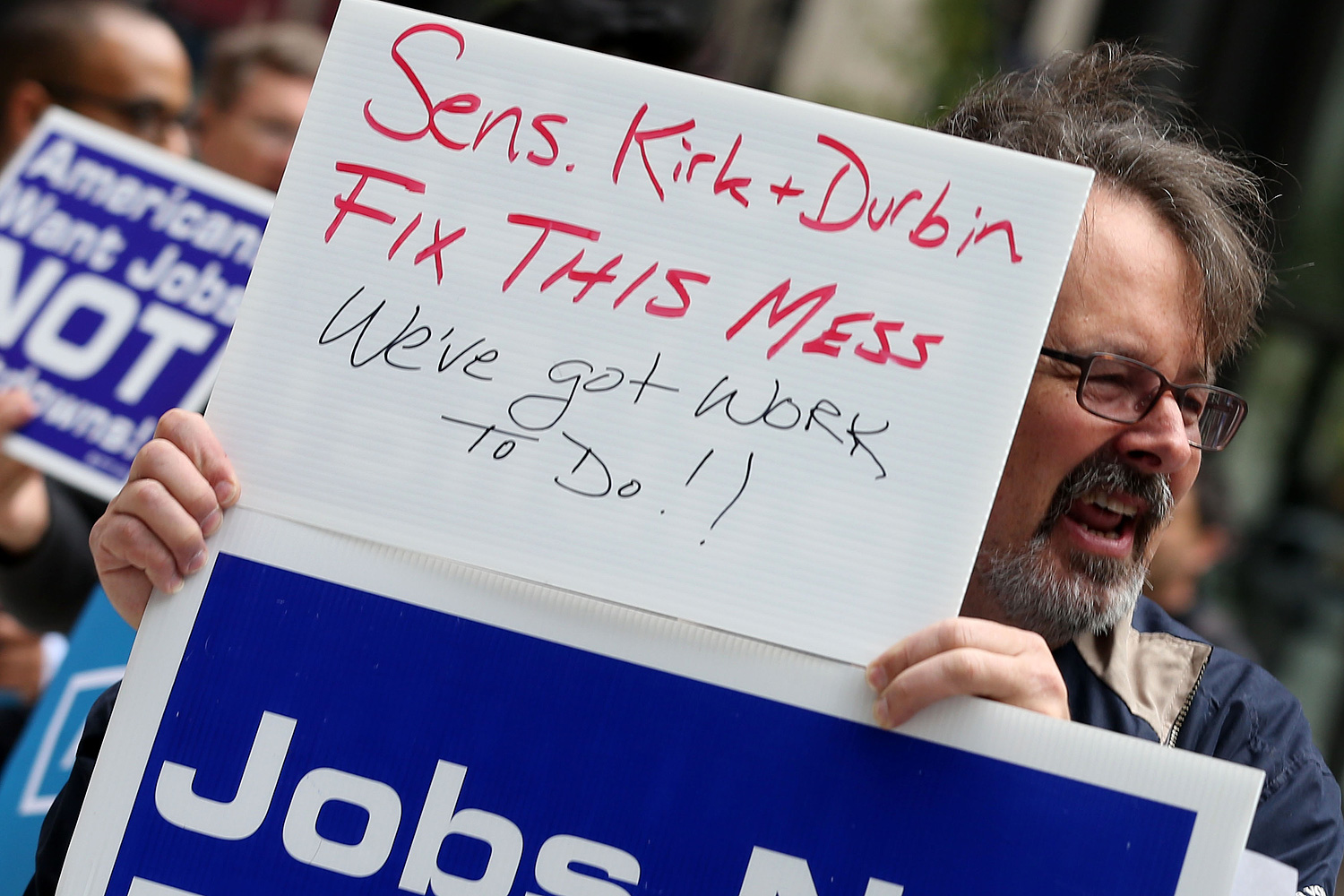Last night, the Trib's Kristen McQueary joked:

It's funny, but it's actually true. (A deal looks to be in place that would raise the debt ceiling, but only until February, when we could go through this all over again.) If Congress doesn't allow the federal government to pay off the debts that Congress incurred, the United States will do what Illinois does… if we're lucky.
You're probably aware that Illinois doesn't have the money to pay its debts, and when it doesn't, it stiffs its creditors—at least in the form of late payments to contractors, departments, and local governments.
This is fiscally and morally unsound, but it's not catastrophic to the state's credit rating, because its bondholders do get paid. By law, they have to be, and that's how the Comptroller's office is set up. That's why the state's rating, while comparatively low, still allows the state to borrow money at relatively affordable rates.
Those rates are higher than other states' rates, which comes at no small expense, but there's some question that the rates might be too high—that the risk bondholders won't get paid is still so vanishingly small, even with the state's ongoing fiscal crisis, that the rates are higher than the actual risk should reflect. States just don't stiff bondholders, or at least haven't since Arkansas in the Great Depression. Which was a disaster, but obviously Arksansas is still around and has roads and everything.
Stiffing our creditors does make the ratings agencies unhappy, since it signals to bondholders that if things get catastrophically bad, Illinois is in worse shape to deal with that than other states. So the risk gets priced in, but it's undeniably a small risk.
If the federal government runs out of money to pay its creditors, on the other hand, no one really knows who's first in line to get paid. And that's what has people terrified.
It's possible that the U.S. could do what Illinois does: put the bondholders first and stop paying everyone else. That could mean contractors; it could mean Social Security recipients; no one's really sure. This is the position of the Heritage Foundation and the Cato Institute. In an important post, Mike Konczal previews what's likely to be the spin if the government defaults and starts stiffing bondholders: it's Treasury's fault.
“Congress still has some time and options. Even if the debt limit is not raised by mid-October, Boccia writes, ‘the Treasury would not necessarily default on debt obligations,’ as it can ‘reasonably be expected to prioritize principal and interest payments on the national debt, protecting the full faith and credit of the United States above all other spending.’”
In that sense, it is a bit like a household budget. If you don't have enough money to pay the bills one month, it makes more sense to pay off your credit card to prevent your interest rate from skyrocketing, rather than paying your ISP or phone bill because you can put them off without as much risk to your pocketbook or credit rating. And that's what Illinois does, because we have to. If the federal government does that, the effects are pretty obvious—lots of people previously getting paid won't be; lots of important stuff that usually works won't; and the combination will slow the economy. (Depending on what doesn't get funded, our ability to measure that slowdown could also be effected.)
But that isn't federal law. Treasury isn't sure whether it can technically or legally move bondholders to the front of the line, and that's how things could get much, much worse than they are here, very quickly.
As Brad Plumer explains, Treasury claims they aren't logistically set up to do that, unlike Illinois, where putting the bondholders first is how the Comptroller's office already works. And then there's this:
It's unclear whether Treasury even has the legal authority to prioritize payments — the agency has never dealt with this situation before. "Anyone who says they know for sure whether this is legal is not telling the truth," said Steve Bell, a former Republican staff director of the Senate Budget Committee now at the Bipartisan Policy Center.
Plumer also notes that the government has defaulted before, mostly because of paperwork errors. And it was very expensive, despite not being the kind of default to terrify markets—it's like forgetting to sign your rent check. It'll piss off your landlord, but your landlord also has an interest in not punishing you too harshly. If the federal government voluntarily defaults, it raises questions about the full faith and credit (and sanity) of the United States.
And that kind of risk is extremely expensive. So expensive that no one knows how expensive it is. That's why people are freaking out: stiffing Americans is the best-case scenario, stiffing the world is the worst.




